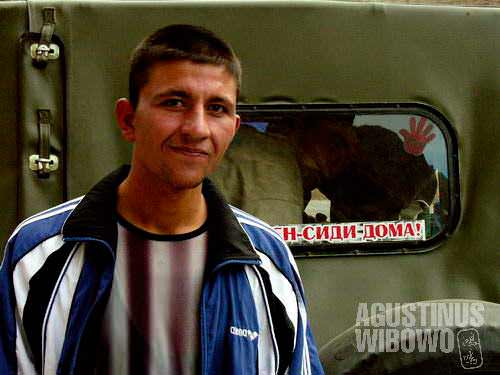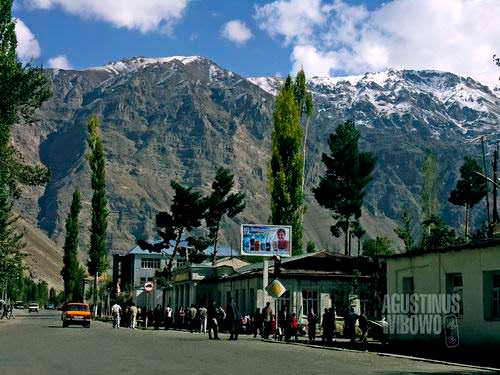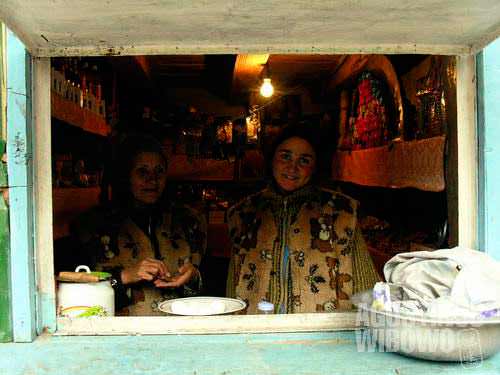Khorog – The Capital of GBAO

Driver is a respected job in Tajikistan, especially in GBAO where most people still struggle of unemployment
“Thanks to God, thanks to Aga Khan, for their kindness to us” – Mamadrayonova Khurseda
The provincial capital of GBAO, Khorog, is a little town set in a valley surrounded by vertical cliffs of high mountains. It is cool and lazy, and despite of its proximity with Afghanistan, it is quite laid back. The appearance of military still can be felt intensively in the town, thanks to the neighbouring Afghanistan, which is just across the river and notorious for opium export and illegal border crossing. Young soldiers have to patrol every morning along the misty and freezing river. The 1300 km long border with Afghanistan gives much headache to Tajikistan, and its patron – Russia. Russian guards were playing a big role in ‘saving’ the war torn Tajikistan from further deterioration. But as the situation of the country had been stabilized for almost ten years now, the existence of Russian and CIS troops had been much reduced since the previous two years.
If you walk along the main street of Khorog, except for the numerous militsia, police, and KGB agents, you will feel that the life here is quite enjoyable. No beggars on street, no hawkers who will push you to buy things, no pickpockets, just giant dogs which may fight each other or chase the poor fat cows. But the actual life of Khorog is an irony despite of its calm and beautiful picture visible at a glance.
During the civil war right after the independence of Tajikistan, GBAO chose to separate from the country and supported the rebel side. Dushanbe government took revenge by isolating the whole area, blocked all of possible roads to the ‘outside world’. The boycott era during the civil war of Tajikistan brought so much sorrow to the province. GBAO is mountainous area, where thousands of majestic peaks compete to reach the sky and leave little space for agriculture. Water is abundant, but oil is not. The four year boycott from its own government nevertheless put the local people under starvation threat.
At that time money was meaningless as nothing to purchase with money. Primitive life of barter trading returned to GBAO, where at peak of crisis, even money disappeared altogether. Most people were unemployed and those who had job were working far less than their own qualification.
The situation was worsened by the sensitive border with the fundamentalist neighbour. Some fractions of the Tajikistan rebel side wanted to turn the country into an Islamic republic. The CIS (dominated by Russian) soldier sent large troops to GBAO to control the long, vulnerable river border. Thus, product flow was completely blocked from Dushanbe and Afghanistan side. The Chinese border at Qolma Pass had never been opened.

The peaceful life in Khorog. You barely see the scars of war. Even the signs of extreme poverty are barely visible.
It was Aga Khan, the spiritual leader of the Muslim Ismaili sect who saved majority Ismaili community in GBAO from starvation. International aid convoy came from Kyrgyzstan. It was also the Aga Khan Foundation which introduced work training programs for unemployed local community, provided micro credit programs, built universities and schools, re-connected the severely separated communities from both sides of the river by building road and bridges, and introduced new income sources from tourism. The same programs are also being implemented in Wakhan and Badakhshan of Afghanistan with a clear aim, to bring better tomorrow for the community.
“Thanks to God, thanks to Aga Khan, for their kindness to us,” said Mamadrayonova Khurseda, a 60 year old woman ex-journalist from Khorog. Life had not been easy for her family since the independence day, and it just improved recently as her homestay was approved to receive tourists by the NGO MSDSP (Mountain Society Development Support Program), a sub ordinary of Aga Khan Fondation. If she only relied on her pension revenue, which is only 21 Somoni (6 dollars) she would starve her old days. Her husband died 12 years ago. She had three sons, one died. Timur, 35 years old, her second son, just got married. But Timur and his wife, as more than 50% of Khorog residents (about 20,000 population) are unemployed. Khurseda’s youngest son used to work as a pilot in Dushanbe and only earned 40 Somoni (about 15$ per month at that time), which was even not enough to buy a ticket from the capital to home in Khorog. The son went to Moscow for better job.
Khurseda remembered the days when everything was good. Her newspaper was the only daily in GBAO, but since the war started the financial of the media shrunk, and it was reduced to be a small weekly. The blockade of the central government in Dushanbe made money and food was so scarce. Money became valueless as everything turned to have astronomical price. How can one survive with only 6 dollar pension per month and has to give life to 3 mouths (as her son and daughter-in-law are unemployed)?
“Thanks to the tourists. They came here and we can live again,” said Khurseda. She rents out her lucxurious rooms for 10 $/night and cooks for breakfast, lunch, and dinner for the tourists for 2 $ each meal. It was the price set and approved by MSDSP. Khurseda sees many tourists coming in summer, but as now the temperature drops down, her business also goes down. Nevertheless she is grateful to Aga Khan Fondation which encouraged tourism in mountainous villages dominated by Ismaili in northern areas of Pakistan, Wakhan of Afghanistan, and GBAO of Tajikistan.
How is the life of unemployed people? Timur, Khurseda’s son, looked like a very bored guy doing nothing in a town where there is really nothing to do. I think he also developed bad psychological attitude due to his boredom. His wife at least still cleans the house, washes the clothes, and cooks. “Life as an unemployed is boring. Time passes very slowly. People grow old very fast, when they have nothing to do. You know, weaving the whole day is boring,” said Khurseda.
The boy next door, Khanjon, just started to enjoy the unemployed life. He just got diploma in electrical engineering some months ago after 5 years study in a local university. As most graduates, he also doesn’t get any job. “It’s not a bad life at all,” said the 24 year old boy, “look, we still survive!” He spent his days in home or meeting friends, or sometimes works in the gardens where the tomatoes and carrots for the family’s daily food are produced. The tomato plants failed completely, but they still can eat carrots. The carrots are too small to sell in bazaar. “Nobody will buy them,” said him. Khanjon’s father is a journalist, and earns 30$ (100 Somoni) per month from the local newspaper and another 30$ from the TV station.

A roadside shop, selling simple snacks and almost nothing else.
The stability of GBAO which then allows more foreign tourists to come, at least has given chance for the locals to find some survival earning. Malik is owner of a precious stone handicraft shop. He said that he sold much more lapis lazuli necklaces to tourists this year. As Khurseda, he was very grateful to the kindness of Aga Khan, whom he regarded as saviour sent by God. The women in the villages were also trained by the NGOs to make handicrafts like carpets and traditional caps.
Life is difficult, but people are crawling to survive.

Leave a comment